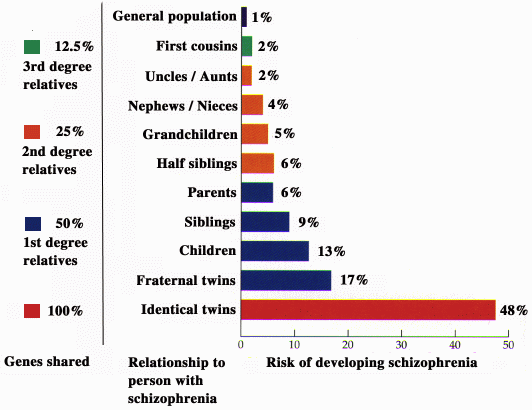Reading Time: 3 minutes
Schizophrenia is one of the better known “diagnoses” out there. Popular references include John Nash in “A beautiful mind”, a brilliant mathematical genius, who finds himself in trouble when he encounters this cruel disorder. Despite its celebrity status, schizophrenia is still very much an enigma, with the word schizophrenia eliciting a million different meanings. Here are 10 things that could help one identify and understand schizophrenia.
`
Popular media has somehow equated schizophrenia with a split personality (better know medically as dissociative identity disorder). These two entities aren’t the same. Schizophrenia is a disorder characterized by a loss of touch with reality in the form delusions, hallucinations, disorganized speech and/or behavior.
2)Schizophrenia and other psychotic illnesses are pretty common
According to the numbers published by the World Health Organization, the prevalence of schizophrenia is twice that of tuberculosis and only 5 million lesser than HIV infection and around 3 million more than rheumatoid arthritis. People don’t talk about it because of the stigma associated with mental illness. In any given society 1-2 percent of the population would be suffering from schizophrenia.
3) The symptoms of schizophrenia are . . .
People with schizophrenia may have hallucinations (hearing and seeing things that aren’t there), delusions (false beliefs that held with conviction) & difficulty with social communication, memory and other cognitive abilities. Negative symptoms such as poor self-care, poor interaction and apathy may also predominate.
4) These symptoms are not “imagined”
Modern medical science has repeatedly demonstrated abnormalities in brain circuitry in those with schizophrenia. The symptoms of schizophrenia are not under conscious control and the nature of the disorder makes it very difficult for sufferers to reason with their own thoughts. These people do not have weak minds, but rather a problem in the neural circuitry of the brain.
5) Treatment is available and fairly effective in many.
Up to 70% of those diagnosed with schizophrenia will respond to medications and up to half of them achieve a complete remission from symptoms. There is, however, a large subset of individuals who do not respond optimally to medication alone. Treatment adherence is one of the most important factors that predict outcomes.
6)Schizophrenia is multifactorial.
A number of factors that include genetics, birth season, events around childbirth, exposure to infectious agents, epilepsy and a number, exposure to stress at a young age, substance use and a number of other factors have been proven to contribute to the development of schizophrenia. In identical twins, a concordance rate of around 50% proves that genetic inheritance is not the only factor that leads to schizophrenia.

7)Not every person with schizophrenia is violent.
Violence is a label that needs to be stripped of the whole spectrum of mental illnesses. Most people suffering schizophrenia have the exact same potential for violence and aggression as you and me. The risk of violence does exist, however, is better of evaluated with generalizations kept aside.
8)People with schizophrenia can be as productive as you and me.
A number of people diagnosed with schizophrenia, recover adequately enough to study, work, play and love. There professionals, doctors, lawyers and others who have overcome the disorder with the aid of meds and therapy and lead more or less normal lives. The treatment of schizophrenia is thus of utmost importance if one were to give sufferers a chance to live a normal life.
9)The risk of SUICIDE is high!
Around 10-15% of those with schizophrenia die by suicide. Though It’s hard to predict those who are prone to attempt suicide, this number can definitely reduce if the society at large was able to empathize with those with schizophrenia and not banish them to isolation.
10)People with schizophrenia need your help
Doctors work on helping those who do seek help. However, the number of people who do seek help for the treatment of most mental illnesses, including schizophrenia is pretty low. Further, employers continue to discriminate against those suffering from mental illness. We need you to get up and put your hand out for those suffering from mental illnesses including schizophrenia. Talking about schizophrenia improves awareness which, in turn, improves help-seeking behavior and outcomes. We are talking about people with illness, much like people with heart disease and people with cancer. We need to let them know that we understand.We need you to eliminate the stigma associated with mental illnesses.
Here are a few more helpful posts